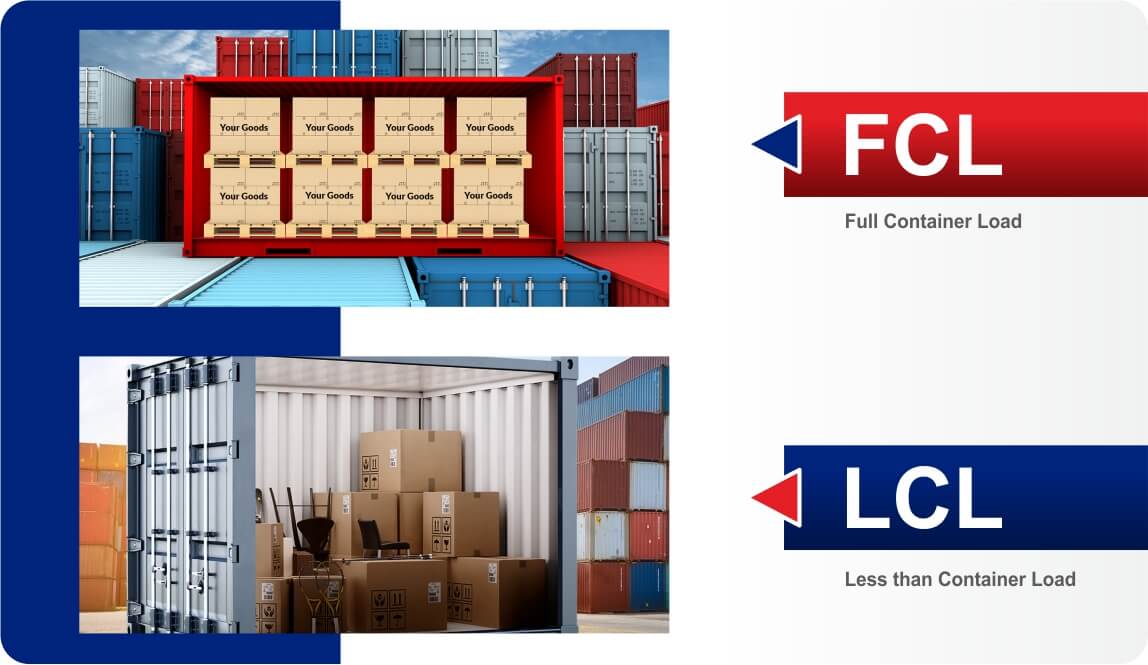




If reliability and cost effectiveness are the criteria then sea freight is often the best choice for businesses who are looking to ship goods across the globe. However, once you enter the world of ocean shipping, you are greeted with a big and highly impactful decision: What is better LCL or FCL? As you would be aware Full Container Load (FCL) or Less than Container Load (LCL) are the two ways one can send goods through sea freight.
If you too are worried about which option to choose, then worry no more, we have got you covered. Here in this blog we help you understand the whole debate of fcl vs lcl and pressing concerns such as which option is cheaper and better for you.
Before we get into the details, let’s understand what these terms mean.
FCL (Full Container Load):
As the name suggests, this option is about booking an entire shipping container for your cargo. The important aspect to note here is: You will not be sharing this container with anyone else. Every inch of space in the container is for your goods. Whether you fill it or keep it empty, it stays yours. Containers typically come in 20-foot or 40-foot sizes, and your goods are sealed inside safely until they reach their destination.
LCL (Less than Container Load):
This is like carpooling for cargo. What if you don't have enough goods to occupy an entire container? Then, this is the option for you. You rent some space for the container. Your goods are consolidated with other shippers’ goods in a shared container. Your cargo is packed, tracked, and separated at the destination.
Now that we have understood the basics down, let us dive into the details to see how these options stack up.
Booking a full container might sound as if it's an option only reserved for big players, but it's not like that. FCL can be a smart choice for businesses of all sizes. Here is why:
Speed and Efficiency:
Since your container isn’t being opened and sorted at multiple points, FCL shipments have lesser stops. This results in moving the container fast and your goods get to their destination quicker.
Lower Risk of Damage:
Your cargo is sealed in its own container. Hence, there is lesser chance of it being bumped, jostled, or mishandled alongside other shipments.
Simplified Pricing:
In FCL you are paying for the entire container. So you enjoy a flat rate for the container, making it easier to predict costs. So you are saved from any surprises based on weight or volume.
Ideal for Large Shipments:
If the size of your shipment is large, let us assume it's enough to fill in a 20-foot or 40-foot container, then FCL is usually the most cost-effective option.
Higher Upfront Cost:
In FCL, it doesn't matter whether you fill the entire container or not. You are still paying for the whole thing. So if you have smaller shipments, this can feel like overkill.
Not Ideal for Small Loads:
If your cargo only takes up a fraction of a container, you’re essentially paying for unused space.
FCL is a great fit when you are shipping high-value goods, fragile items, or large volumes. It is also the way to go if you need faster transit times or want peace of mind knowing your cargo is not mixing up with others.
For example, if you are a furniture manufacturer sending a batch of tables and chairs to an overseas retailer, FCL ensures your products arrive intact and on time.
If you have a smaller shipment, LCL will be the best bet for you. It is effective for businesses that do not need a full container but still want to tap into the cost savings of sea freight.
Cost-Effective for Small Shipments:
With LCL, you are only paying for the space your cargo takes up and it is calculated by volume (cubic meters). Hence, this makes LCL budget-friendly for smaller loads.
Flexibility:
LCL is perfect if your shipping needs vary from month to month. You do not have to commit to a full container every time.
Access to Global Markets:
Even if you are a small business, LCL lets you ship to international customers without breaking the bank.
Slower Transit Times:
Since your cargo is consolidated with others, extra time is spent packing, unpacking, and sorting at both ends of the journey. This results in an increase in the overall shipment timings.
Higher Risk of Damage:
Sharing a container means more handling, which can increase the chance of your goods getting damaged or lost.
Complex Pricing:
LCL costs are based on volume, and additional fees, which include costs like customs clearance or handling. So the budgeting can become trickier.
LCL is the most effective and reliable option for small businesses, startups, or anyone who is shipping smaller quantities. For instance, if you are an e-commerce store sending a few boxes of handmade toys to a boutique overseas, LCL allows you to keep costs low while still reaching your customers.
So far we have understood the aspects of the FCL vs LCL debate. Now let us understand how we can decide between FCL and LCL? Here are a few questions to ask yourself:
Whether you go with FCL and LCL shipments, working with an experienced logistics provider makes all the difference. At Atlantic International Express, we specialize in providing sea freight services to fit your unique needs. Our team will analyze your shipment size, budget, and timeline and will offer recommendations on which is the best option—FCL, LCL, or even a hybrid approach. We handle the details, from customs clearance to container tracking, so you can focus on growing your business.
There is no clear answer for the LCL vs FCL debate. Choosing between FCL and LCL depends on your shipment size, budget, and priorities. FCL offers speed, security, and simplicity for larger or sensitive loads, while LCL provides flexibility and cost savings for smaller shipments. By taking into consideration the pros and cons and partnering with a trusted logistics provider, you can make an informed decision that keeps your supply chain humming.
Ready to ship smarter? Contact us today to explore your FCL and LCL options and get a personalized quote. Let’s get your goods moving!
LCL is cheaper for small loads, as you pay only for the space used. FCL is more cost-effective for large shipments with a flat container rate.
FCL suits large, fragile, or urgent shipments for speed and security. LCL is better for smaller, budget-friendly shipments with flexibility.
LCL has no strict weight limit but is typically limited to a few tons per shipment, depending on the provider and route.
FCL offers faster transit, lower damage risk, predictable flat-rate pricing, and is ideal for large or sensitive shipments.
LCL is cost-effective for small loads, flexible for varying shipment sizes, and enables small businesses to ship globally.